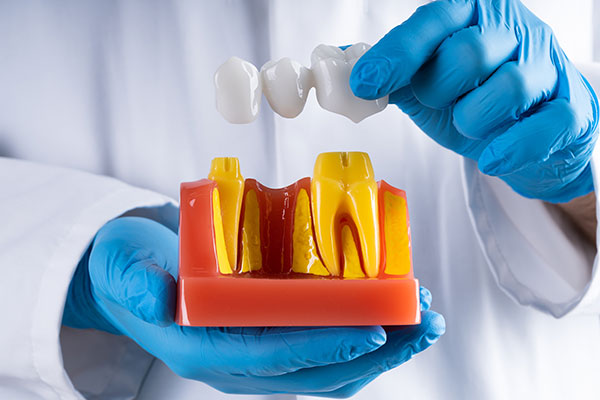Restore Your Smile With Dental Bridges
Losing a tooth can be a difficult experience, affecting both the appearance and functionality of your smile. Fortunately, dental bridges are a popular and effective treatment option for replacing missing teeth. Don’t let your dental health get worse — replace your missing tooth or teeth at Holyoke Mall Dental.
Contact our dentist in Holyoke today by calling our dental office at (413) 538-7400. We’ll schedule your consultation as soon as possible so you can get your oral health back on track.
What Are Dental Bridges?
Dental bridges are prosthetic devices that are used to replace missing teeth. They consist of one or more artificial teeth that are supported by the surrounding teeth or dental implants. Dental bridges can be made from various materials, including porcelain, ceramic, or metal.
Different Types of Dental Bridges
There are several types of dental bridges, including:
- Traditional Dental Bridge: This is the most common type of dental bridge. It consists of one or more artificial teeth that are anchored to adjacent teeth using dental crowns.
- Cantilever Dental Bridge: This type of bridge is used when there’s only one adjacent tooth available to support the artificial tooth.
- Maryland Dental Bridge: Also known as a resin-bonded bridge, this type of bridge is made of a metal or porcelain framework that’s bonded to the back of supporting teeth. Maryland bridges are typically used to replace front teeth.
- Implant-Supported Bridge: This type of bridge is supported by dental implants instead of natural teeth. Implant-supported bridges are a more durable and long-lasting option, as well as a more costly one.
Dental Bridges Benefits
When replacing a missing tooth or teeth with a dental bridge, patients may experience the following benefits:
- Restored smile
- Improved functionality
- Maintains facial structure
- Prevents further dental complications
- Long-lasting restoration
- Affordable solution
- Boost in confidence
- Minimally-invasive procedure
To schedule your consultation, contact Dr. Eric Chen at Holyoke Mall Dental by calling (413) 538-7400 today.
Dental Bridge Procedure
The dental bridge procedure involves preparing the adjacent teeth, called abutments, by reshaping them to support the bridge. A custom-made bridge, consisting of the replacement tooth or teeth (called pontics) and crowns for the abutment teeth, is then placed over the prepared teeth with dental cement, restoring function and aesthetics.
The bridge is cemented in place, providing a fixed solution for missing teeth. After getting a dental bridge, proper care ensures its longevity, so make sure to schedule regular dental check-ups and keep a consistent oral hygiene routine at home.
The Cost of a Dental Bridge
While the costs of your dental bridge will vary based on several factors, you can expect to spend between $2,000 and $5,000. Factors that will influence the total cost include:
- Geographical location
- Materials used
- The type of dental bridge (cantilever bridge, implant-supported bridge, traditional fixed bridge, Maryland dental bridge) needed
- Number of teeth that need to be replaced
- Dentist’s expertise and experience
- Dental insurance plan
- Additional procedures
Can You Get a Dental Bridge?
Being a candidate for a dental bridge depends on several factors. Our dentist will consider the following before recommending a dental bridge procedure:
- Location of Missing Teeth: A dental bridge requires healthy, existing teeth on either side of the gap to serve as abutments (support). If there aren’t stable teeth on either side, a bridge may not be an option.
- The Health of Adjacent Teeth: The supporting teeth need to be strong enough to support the bridge. This means they should be free of decay and gum disease and have good bone support. If the adjacent teeth are compromised, they might not be suitable as abutments, or they might require treatment first.
- Number of Missing Teeth: Traditional bridges are generally suitable for replacing one to three adjacent missing teeth. If more teeth are missing or spread out, other options like partial dentures or dental implants might be more appropriate.
- Oral Hygiene: Patients should have good oral hygiene habits or be willing to improve them. A bridge requires meticulous cleaning around and under the false tooth/teeth.
- Gum Health: Patients with untreated gum disease might not be good candidates for a dental bridge until the gum issues are addressed.
- Occlusion (Bite) Considerations: The way the upper and lower teeth come together (the bite) can influence the success of a bridge. If there are significant bite issues, they might need to be addressed either before or in conjunction with a bridge placement.
- Bone Loss: If a tooth has been missing for a long time, there can be significant bone loss in that area. While this doesn’t necessarily preclude someone from getting a bridge, it might make other options, like implants, more challenging without additional procedures like bone grafting.
If a dental bridge isn’t right for you, our Holyoke dentist may recommend other alternatives, such as dental implants or dentures.
Frequently Asked Questions
On average, dental bridges can last between five to 15 years, and even longer with proper care and maintenance. The lifespan of a bridge varies based on the type of bridge, materials used, oral hygiene practices, and regular dental check-ups. Implant-supported bridges tend to last longer than traditional bridges or cantilever bridges.
Unlike natural teeth, dental bridges can’t be whitened using traditional teeth-whitening methods. This is why it’s essential to select a shade that matches your desired tooth color when first getting the bridge. If your bridge does become stained, it may require professional cleaning or, in extreme cases, replacement to restore its original appearance.
Schedule Your Dental Bridge Consultation With Dr. Chen Today
Are you ready to replace your lost teeth? Don’t wait any longer! Contact our dentist in Holyoke today by calling (413) 538-7400 to schedule your consultation for a dental bridge. Dental bridges can restore your smile and help you find the confidence you once had.
We can’t wait to meet you and help you achieve exceptional oral health! We’re proud to provide top-rated restorative dentistry services in the Greater Springfield area, including Westfield, Southampton, South Hadley, and nearby Western Massachusetts communities.


